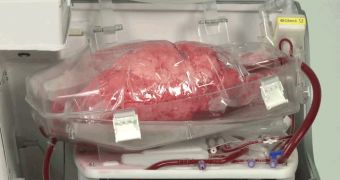When major organs such as the heart or lungs are harvested from a donor, doctors only have 5 to 10 hours to deliver them into a new host. Any longer than that and the organs die. This happens because they stop working, but mostly due to low-tech transportation techniques.
Lungs, for example, are very quick to start degenerating, because they do not get fresh air or any blood flow. Currently, organ transportation devices resemble the ice box you would use to carry cold beer around. While this may suffice for some organs, others will inevitably degenerate.
Hearts share a similar issue. They too need to be transplanted within a maximum of 10 hours after being harvested, otherwise cell death sets in, and the organs become unusable. Ice-filled coolers are insufficient to keep a heart viable for transplant, NPR reports.
Scientists with the Andover, Massachusetts-based company TransMedics are currently developing an innovative organ transportation and support system, simply called the Organ Care System (OCS). This instrument is basically a lung-in-a-box, and can keep lungs alive for longer.
The OCS does so by connecting the organ to an air and blood supply, thus allowing it to breathe and carry out its normal functions outside of the human body. When refined, this technology has the potential to increase organ transportation windows by several hours, potentially saving hundreds of lives each year.
Though the OCS has not yet been approved by the US Food and Drug Administration (FDA), eight hospitals around the country are already testing it in a clinical trial. TransMedics has already announced plans to develop a similar machine for transporting hearts safely, and with no discernible deterioration.
Unlike existing devices, which use the cold to prevent tissue damage, the OCS-like system for carrying hearts around would keep the heart warm, by fueling it with blood and soaking it in nutrients. Early results are very encouraging, TransMedics says; more than 12 patients received organs on time due to the OCS to date.
“On an annual basis, more than 30 or 40 hearts in Hawaii go unused. Because of the distance, these hearts cannot be transported to the mainland,” comments transplant surgeon Abbas Ardehali, who is based at the University of California in Los Angeles (UCLA).

 14 DAY TRIAL //
14 DAY TRIAL //